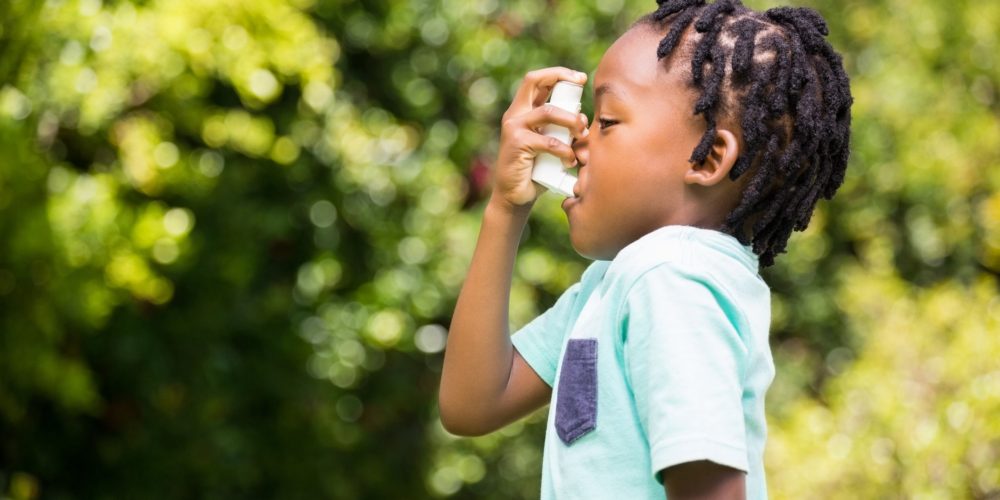Children with eczema have a high risk of developing allergies and asthma. According to the National Eczema Association, up to 80% of children with eczema will develop hay fever and asthma. Thirty-seven percent of those children will also have sensitivities to certain foods, such as eggs, nuts, or milk.
When my son was first diagnosed with asthma, I remember being overwhelmed and thinking, “wow, we are finally getting the hang of this eczema thing and now we tag on asthma…seriously?” I knew based on my research of eczema, he was at a higher risk for developing asthma and allergies, known as the “atopic march,” but I was hoping he would be spared. The “atopic march” involves the diagnosis of eczema during infancy, followed by food allergies, hey fever, and asthma (typically in that exact order). We’ll discuss the “atopic march” in further detail later in this section.
As a new mom, the fact that I would have to manage another medical condition was overwhelming. I mean, here I am one month before my son’s first birthday, and I am sitting in the ER with a wheezing child and flared skin. I remember thinking… “now what…what’s next?” But oh was I in for a rude awakening when he was later diagnosed with “allergies!”
Besides our son’s eczema, managing his allergies has probably been our biggest challenge, as he only has a mild case of asthma. Looking back now and analyzing his eczema breakouts during infancy, there were several signs that he may have allergies, but I didn’t correlate the two. When I was breastfeeding, I knew that eating certain foods would trigger a flare, but I did not know that my child could potentially be allergic to them. Pretty naïve right? So when he was diagnosed with asthma, along with his medical history of eczema and sensitivities to certain foods I ate, our pediatrician advised us to meet with an allergist. Low and behold the same foods that triggered a reaction during breastfeeding, were the very same foods he was allergic too. Let’s just say, the atopic march was alive and in full effect! So like me, I’m sure you are wondering…. what is the connection? Why do children with eczema, typically develop asthma and allergies?
Research shows that African American children are 20% more likely to develop asthma than their white counterparts and are six times more likely to die from asthma related causes than non-Hispanic whites.
The Atopic March
For some children, the diagnosis of eczema, allergies, and asthma come in a particular order as they get older. It typically starts with being diagnosed with eczema during infancy, followed by food allergies, asthma, then hay fever. This is known as the “atopic march.”
Genetic predispositions also play a huge factor. Studies have shown that if one or both parents has one of these conditions, then their child will have a higher risk of also having eczema, allergies, and asthma. Additionally, children who develop eczema at a young age or have a more severe case of eczema, have higher odds of developing allergies and eczema. The was the case in our situation. My husband had a medical history of seasonal allergies; whereas, I had a medical history of childhood asthma. Neither one of us had eczema, but it wasn’t until our son was diagnosed with eczema that we discovered several of our family members also suffered from eczema.
As a caregiver, what can you do….
Asthma and allergies are pretty serious conditions and can be quite scary, especially for caregivers of brown children. Research shows that African American children are 20% more likely to develop asthma than their white counterparts and are six times more likely to die from asthma related causes than non-Hispanic whites. As parent of a brown child with asthma, these statistics are quite alarming. However, the tips below are a few things I’ve learned to help manage eczema and minimize the onset of asthma attacks and allergic reactions.
- Breastfeeding – Some evidence shows that breastfeeding for the first 6-12 months can minimize your child’s chances of later developing allergies and asthma. In our case, breastfeeding assisted us with identifying certain foods that our child was allergic to, based on the foods I ate.
- Healthy Diet – Maintaining healthy eating habits and monitoring what your child eats, is the key to treating your child’s body internally to minimize the body’s external reaction to an allergen.
- Allergy Testing –Those with a severe case of eczema may benefit from food allergy testing and potentially removing certain foods from their diet. The most common food allergies associated with eczema are cow’s milk, eggs, soy products, gluten, fish, and nuts. While your child may not be sensitive to these foods, the important thing to remember is to introduce healthy foods into your child’s diet and be aware of what foods trigger a reaction. Hey fever is also commonly associated in children with eczema. Look for signs of itching, sneezing, wheezing, and coughing as an indicator of hay fever, especially if your child has been exposed to common allergens such as ragweed, pollen, dust, dogs, or cats. I can personally say that allergy testing provided clarity to numerous unexplained allergic reactions and eczema breakouts, but most importantly it saved our son’s life by making us aware of his highly allergic levels to peanuts and fish.
- Medical Advice. Always seek medical advice from your child’s pediatrician and allergist for guidance on managing your child’s allergies and asthma. The sooner your child seeks medical attention, the better you will be able to manage their condition.
Check out our Treatment section for tips on managing your child’s eczema
Remember…
Just because your child has eczema, it doesn’t mean they will experience the above conditions; it just means there is a higher risk of them developing them. If this is your story, like it is ours, with the help of trusted medical professions and a few lifestyle changes, you will be able to manage your child’s asthma and minimize allergic reactions.




Leave a Reply